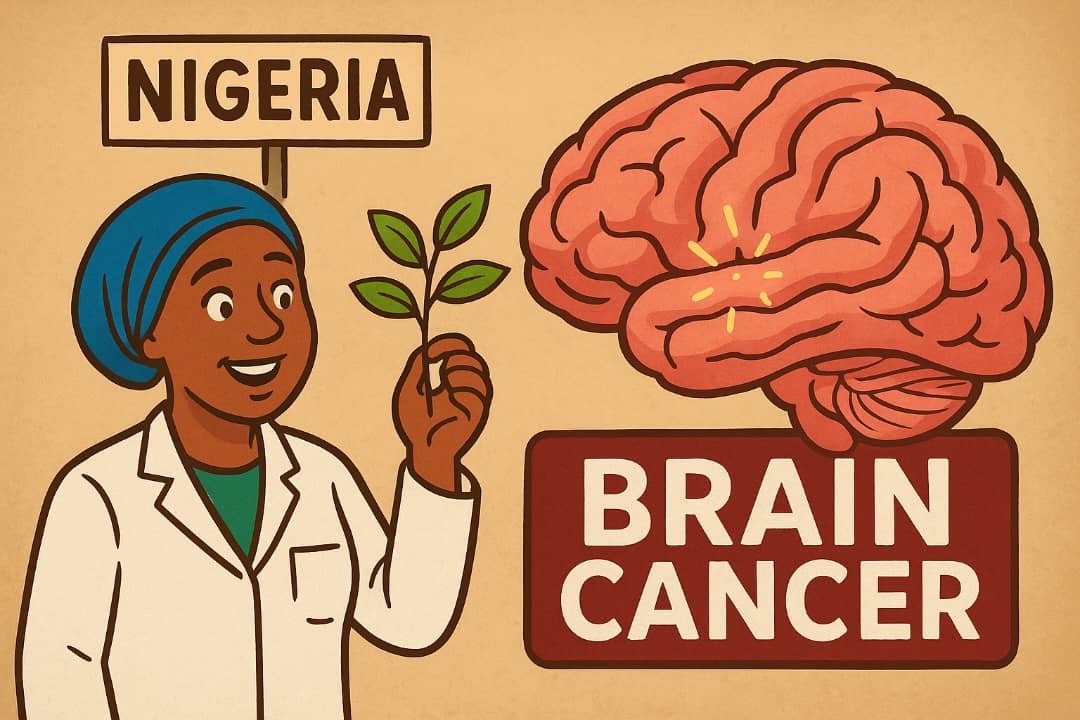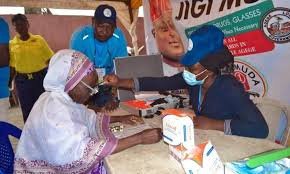
Researchers at Nigerian medical institutes are racing to develop an indigenous, plant-based cure for brain cancer — a breakthrough that could redefine Africa’s cancer treatment landscape. (Image: AI-generated)
LAGOS, Nigeria – In a quiet laboratory tucked inside Usmanu Danfodiyo University, Sokoto, Nigerian researchers believe they may have stumbled upon something extraordinary — a molecule, extracted from a native plant, that kills brain cancer cells within 48 hours.
Now, the Federal Government is rallying its top scientists behind the potential breakthrough, determined to prove that Africa’s most populous nation can find a cancer cure born from its own soil.
In a move that could reshape the continent’s medical future, the Minister of State for Health and Social Welfare, Dr Iziaq Salako, has ordered Nigeria’s major research institutions to unite behind the study — a bold attempt to develop a homegrown cancer therapy using indigenous knowledge and modern science.
“The phytomedicine sector must be prioritised in unlocking Nigeria’s healthcare value chain,” Dr Salako declared during a virtual meeting with research leaders. “Nigeria must drive its own medical innovations using indigenous knowledge backed by modern science.”. In this report, Korede Abdullah, Africa Health Report Southwest Correspondent, writes on the promise, politics, and possibilities behind Nigeria’s bold quest for a homegrown cancer solution.
A Molecule with Extraordinary Promise
The discovery, led by the Centre for Advanced Medical Research and Training (CAMRET), has ignited cautious optimism among Nigeria’s scientific community.
According to team lead Dr. Amina Yusuf Jega, the plant-derived compound has demonstrated remarkable cytotoxic activity against glioblastoma multiforme — one of the world’s most aggressive brain cancers.
“This discovery shows immense potential for developing a safe, affordable, and accessible cancer therapy from local resources,” Dr Jega said in an interview. “Our initial tests indicate a 48-hour response in destroying malignant cells.”
Encouraged by early results, her team is expanding tests to other cancer types — including breast, liver, cervical, and leukaemia — with promising preliminary outcomes.
While Dr Jega’s words have sparked national pride, scientists and policymakers alike agree that the journey from lab success to life-saving drugs is long and arduous.
Government Backs Collaborative Research Drive
Determined to nurture the discovery beyond the laboratory, the Federal Government has directed three major research bodies — the National Institute for Pharmaceutical Research and Development (NIPRD), the Nigerian Institute of Medical Research (NIMR), and the National Institute for Cancer Research and Treatment (NICRAT) — to pool expertise and resources.
Dr Salako confirmed that a special committee would soon be inaugurated to bridge the gap between government, academia, and private investors.
“Innovation thrives where science meets policy,” he said. “We cannot depend indefinitely on imported cancer treatments. This collaboration will accelerate our transition to evidence-based local solutions.”
The Ministry of Health has requested CAMRET to submit a detailed funding proposal for technical review and federal support — signalling official confidence in the project’s scientific merit.
Global Partnerships on the Horizon
The Director-General of NICRAT, Prof Usman Malami Aliyu, has pledged institutional backing, revealing that NICRAT has already reached out to CAMRET to formalise collaboration.
In the same vein, Director-General of NIPRD, Dr Obi Adigwe, disclosed plans to send a CAMRET researcher to China in early 2026 for advanced oncology training.
“We are also preparing for a joint research engagement with Stanford University in February 2026,” Dr Adigwe said. “This partnership will ensure Nigeria’s cancer research meets global standards while remaining locally relevant.”
Such alliances, he noted, would help Nigerian scientists gain exposure to cutting-edge cancer research methodologies and foster credibility within the international scientific community.
From Petri Dish to Patient: The Long Road Ahead
Despite the excitement, cancer experts warn against premature celebration.
The Director-General of NIMR, Prof. John Obafunwa, emphasised that promising laboratory results often fail when tested in humans.
“If this research can extend brain cancer survival rates beyond the current 12 to 15 months, it will mark a major advancement,” he said. “But this will require extensive clinical trials, ethical clearance, and substantial funding.”
Prof. Obafunwa cautioned that Nigeria’s regulatory framework and limited laboratory infrastructure could slow down the transition from experimental trials to clinical reality.
Cancer in Nigeria: A Growing Emergency
Cancer remains one of Nigeria’s deadliest public health crises. According to the World Health Organisation (WHO), 88 women are diagnosed with cancer every day, most commonly breast and cervical cancers.
The Global Cancer Observatory (GLOBOCAN 2024) estimates that breast cancer alone accounts for more than 37,000 new cases annually.
Chief Medical Coordinator at Medserve-LUTH Cancer Centre, Dr Muhammad Yakub Habeebu, recently in an interview on a national broadcast said the statistics are “a national emergency.”
“Every person lost to breast cancer affects an entire family and community,” he said. “Late presentation remains the major reason for Nigeria’s high cancer mortality rate.”
Experts Call for Infrastructure and Policy Support
For many experts, Nigeria’s scientific breakthroughs can only translate into real impact if matched by investment in research infrastructure and equitable healthcare access.
Dr Habeebu noted that Nigeria has fewer than ten fully functional cancer treatment centres, a figure grossly inadequate for a population of over 200 million.
“Access remains the biggest barrier,” he said. “If early screening centres were more widespread, most cancer deaths could be prevented.”
Pharmacist Adebayo Martins, in an exclusive interview with Africa Health Report, echoed these concerns.
“Developing a plant-based cure is a bold step,” he said, “but without strong research capacity, transparency, and funding, the project may never reach patients.”
Guarding Scientific Integrity
Dr. Martins further urged caution, warning that the discovery must not be politicised or commercially exploited before it is scientifically validated.
“Discoveries of this magnitude must go through rigorous verification and ethical testing before public endorsements,” he cautioned.
“Pharmacists and scientists have vital roles in formulation, validation, and quality assurance, but only if the process remains transparent from start to finish.”
He also called for continuous oversight by independent review boards to safeguard against conflicts of interest or premature marketing of the research findings.
A Nation at a Crossroads
Nigeria’s cancer burden underscores a deeper truth — innovation must be backed by integrity, funding, and political commitment.
The planned partnerships with Stanford University and China may bridge Nigeria’s knowledge gaps and offer validation through global peer review.
Dr Salako remains confident:
“This is not just about science,” he said. “It’s about national pride, self-reliance, and saving lives.”
If Nigeria sustains the momentum — with transparency, research discipline, and local funding — the Sokoto discovery could mark the dawn of a new chapter in African medical innovation.
But as history reminds us, the real test will not be in the petri dish — it will be in whether science, politics, and policy can finally align to save lives.



